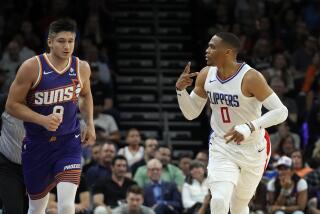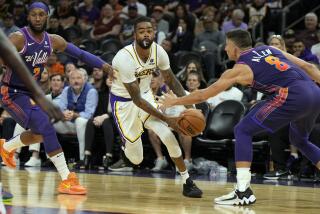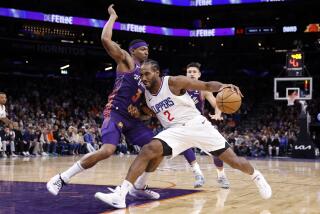Ceballos Is Beacon for Suns : Western: His 21 points show the way during 105-91 victory over the SuperSonics.
- Share via
PHOENIX — The spotlight came, not unexpectedly, to the Phoenix Suns’ frontline, where Charles Barkley waits patiently for the announcement of the NBA’s most valuable player, a ceremony that could take place as soon as today.
Only that wasn’t Barkley scoring a game-high 21 points Monday night to lead the Suns to a 105-91 victory over the Seattle SuperSonics at America West Arena in Game 1 of the Western Conference best-of-seven finals series. It was the starting small forward.
But that wasn’t Richard Dumas starting at small forward. It was Cedric Ceballos, the new star.
“I guess you’d just say it was more of a whim than anything,” Phoenix Coach Paul Westphal said of his decision to play Ceballos ahead of Dumas.
“That was a coach-of-the-year decision,” Ceballos added.
The Cal State Fullerton and Ventura College product was in the starting lineup for only the second time in these playoffs. The first time was Game 1 against the Lakers, a game the Suns lost.
This time, before 19,023, Ceballos burned Seattle with his speed on the fast break and made the SuperSonics pay for double-teaming Barkley.
“That’s what their plan was--make other people play,” Ceballos said. “Charles is such a great player that they wanted to try and take him out of his game. They wanted to make somebody else be the hero.”
Ceballos came in shooting 41.4% in the playoffs after leading the league during the regular season at 57.6%, including 59.4% after the All-Star break. He was averaging 11.3 minutes during the postseason. He played nine minutes in the deciding Game 6 against San Antonio the previous series and didn’t even get off the bench in Game 5.
“I don’t know,” Seattle Coach George Karl said. “If you hold Charles Barkley to 12 points, and I thought we basically did a good job on KJ (Kevin Johnson) until the fourth quarter. . . . We got beat a lot by the speed of Ceballos. He got out in the open court and we couldn’t find him.”
Barkley came in averaging 26.8 points and 13.7 rebounds in the playoffs, after going 30.3 and 11.1 in four regular-season appearances against the SuperSonics. Come the start of the conference finals, though, he became part of the background.
First quarter: three of six from the field, six points, four rebounds.
Second quarter: two of four, four points, six rebounds.
Third quarter: two missed shots, three rebounds.
Fourth quarter: one of two, two points, one rebound.
Final line: six of 14, 12 points, 14 rebounds in 36 minutes.
“My slow offensive night was dictated by their defense,” Barkley said. “As long as the other guys come through, that makes my life a lot easier.”
The Suns opened an eight-point lead during the first period, lost it in the second and then took control for good after halftime.
Their surge came after Barkley had already missed both of his third-quarter shots, the second with about 7 1/2 minutes to play in the quarter. Phoenix soon led by only 60-59, but went on a 16-6 run as Ceballos had eight points.
The SuperSonics fell behind by 15 points less than three minutes into the fourth quarter and trailed by no fewer than 14 during the final 8:46.
“I don’t think we played aggressively,” Karl said. “I thought we played hard and we tried, but our reaction was slow. I think we were fatigued. I don’t know if it was mental or physical.”
The SuperSonics had ended their previous series Saturday afternoon with an overtime victory against Houston.
“I don’t think they were tired,” Barkley said. “If they can’t recuperate after 2 1/2 days, they shouldn’t be in the NBA. We just played well.”
Western Conference Notes
Rookie center Oliver Miller of the Suns scored 11 of his 15 points and had seven of his 10 rebounds during the fourth quarter. Miller also blocked five shots. . . . Game 2 will be Tuesday night at America West Arena. . . . Charles Barkley went from 5:13 remaining in the second quarter to 3:51 left in the fourth quarter without a basket. His 12 points, only two in the second half, were his 1993 playoff low.
Danny Ainge made three three-pointers to pass former Laker Michael Cooper for No. 1 on the all-time playoff list with 127. They had been tied at 124. . . . The Suns blocked 16 shots, tying for the second most in NBA playoff history. The record is 20, set by the Philadelphia 76ers against the Milwaukee Bucks in 1981. Seattle had 16 against the Utah Jazz last April. Phoenix is averaging three more blocks during the playoffs than during the regular season. . . . The SuperSonic bench was outscored for the first time in the playoffs.
More to Read
All things Lakers, all the time.
Get all the Lakers news you need in Dan Woike's weekly newsletter.
You may occasionally receive promotional content from the Los Angeles Times.







